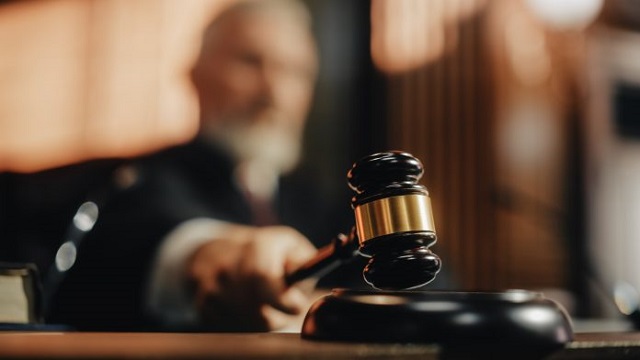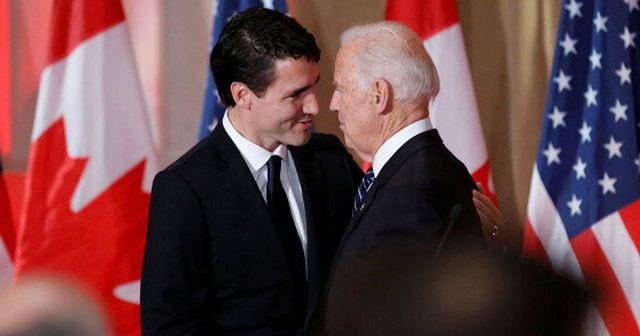International
Justice Jackson slammed for suggesting First Amendment is ‘hamstringing’ government
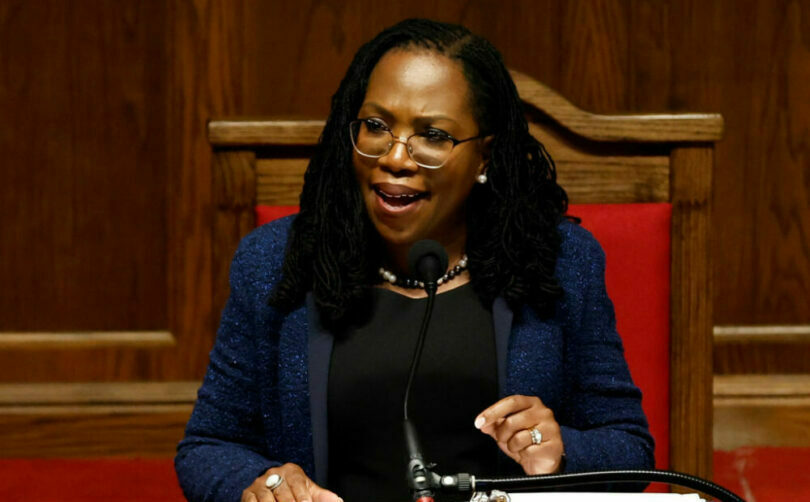
Supreme Court Justice Ketanji Brown Jackson
From LifeSiteNews
By Matt Lamb
Free speech advocates blasted Justice Jackson for defending government censorship efforts and criticizing conservative views about the First Amendment as ‘hamstringing the government.’
Comments made by Supreme Court Justice Ketanji Jackson during a hearing on Monday raised concerns among free speech advocates.
The Supreme Court heard arguments Monday in Murthy v. Missouri, a case concerning collusion efforts between the Biden administration and Big Tech to censor speech about topics like the integrity of the 2020 election and the dangers of the COVID jabs.
“My biggest concern is that your view has the First Amendment hamstringing the government in significant ways in the most important time period,” Justice Jackson asked Louisiana Solicitor General Benjamin Aguiñaga.
She said further:
Some might say that the government actually has a duty to take steps to protect the citizens of this country, and you seem to be suggesting that that duty cannot manifest itself in the government encouraging or even pressuring platforms to take down harmful information.
So, can you help me? Because I’m really worried about that. Because you’ve got the First Amendment operating in an environment of threatening circumstances, from the government’s perspective, and you’re saying that the government can’t interact with the source of those problems.
“Interact” refers to Biden administration officials working closely with X (formerly known as Twitter), Facebook, Instagram, and other platforms to censor speech. In one example, a Biden administration official quickly got Instagram to delete a parody account of Dr. Anthony Fauci.
The comments from Jackson drew criticism from conservatives and free speech advocates.
Missouri Attorney General Andrew Bailey said the “hamstringing” nature of the First Amendment is what makes it valuable.
“It is hamstringing, and it’s supposed to. The whole purpose of the Constitution is to protect us from the government, and the government exists to protect our rights,” Bailey told Fox News. “But here, the federal government is ignoring our First Amendment protections and weaponizing the federal government to silence our voices.
“Free speech is the fundamental lifeblood of all advocacy and even advanced civilization itself. Justice Jackson’s ‘biggest concern’ here – that the government has a duty to take steps to censor speech it deems ‘harmful’ on social media platforms – is exceedingly improper,” Title IX for All, a civil liberties group, wrote on X.
“Yes. The first amendment does limit the government. That’s the point of it,” Rick Esenberg, president of the Wisconsin Institute for Law and Liberty, wrote on X.
Charlie Kirk, president of Turning Point USA, pointed out Jackson could not define what a woman is during her Supreme Court hearing.
Jackson also earlier suggested that a “once-in-a-lifetime pandemic” could justify restrictions on free speech, essentially adopting the arguments of the Biden administration.
“I mean, I understood our First Amendment jurisprudence to require heightened scrutiny of government restrictions of speech but not necessarily a total prohibition when you’re talking about a compelling interest of the government to ensure, for example, that the public has accurate information in the context of a once-in-a-lifetime pandemic.”
Many assertions regarding COVID-19 promoted by the Biden administration have since proven to be false, including claims that COVID shots and masks stop transmission of the virus and that COVID shots are not harmful and are beneficial for children.
espionage
Biden expands government’s power to spy on Americans without a warrant

From LifeSiteNews
Legal experts have pointed out that under an updated version of the Foreign Intelligence Surveillance Act (FISA), delivery personnel, cleaning contractors, and utility providers could all be forced to surveil Americans.
U.S. President Joe Biden has quietly signed legislation reauthorizing and expanding the government’s ability to spy on American communications without a warrant.
On April 20, Biden signed the reauthorization of Section 702 of the Foreign Intelligence Surveillance Act (FISA) that allows the government to compel a broader range of businesses to collect the communications of U.S. citizens when they are in contact with foreigners, according to legal experts.
The newly passed, updated version of Section 702 accomplishes this by expanding the definition of “electronic communication service providers” who can receive FISA directives to tap communications by dropping the qualifier “communication” from electronic service providers. The new amendment, therefore, makes access merely to equipment on which communications are carried or stored enough to legally surveil Americans.
While the amendment lists types of businesses that cannot be considered Electronic Communication Service Providers (ECSPs), including public accommodations, dwellings, and restaurants, ZwillGenBlog points out that the law still allows the government to “compel the assistance of a wide range of additional entities and persons in conducting surveillance under FISA 702.”
“The breadth of the new definition is obvious from the fact that the drafters felt compelled to exclude such ordinary places such as senior centers, hotels, and coffee shops. But for these specific exceptions, the scope of the new definition would cover them — and scores of businesses that did not receive a specific exemption remain within its purview,” ZwillGenBlog explained.
The legal experts noted that among the entities that could be forced to surveil Americans under the amendment are “the owners and operators of facilities that house equipment used to store or carry data, such as data centers and buildings owned by commercial landlords,” as well as others who can access such equipment, including “delivery personnel, cleaning contractors, and utility providers.”
ZwillGenBlog also pointed out that “any U.S. business could have its communications” — if involving a foreigner — “tapped by a landlord with access to office wiring, or the data centers where their computers reside.”
Democratic U.S. Sen. Dick Durbin of Illinois had tried and failed to pass an amendment that would require government officials to obtain a warrant before spying on American communications, according to the Associated Press (AP).
“If the government wants to spy on my private communications or the private communications of any American, they should be required to get approval from a judge, just as our Founding Fathers intended in writing the Constitution,” Durbin said.
Critics of the new amendment warn that over the past year alone the FBI has unconstitutionally spied on Americans, including Republican U.S. Rep. Darin Lahood of Illinois, who serves on the Permanent Select Committee on Intelligence and the Committee on the Chinese Communist Party, as well as Americans present at or near the Capitol on January 6, 2021.
Under Section 702 of the Foreign Intelligence Surveillance Act (FISA), passed in 2008, the National Security Agency (NSA), operating inside the United States, is authorized to collect communications of foreigners overseas for foreign intelligence purposes without a warrant “because courts have held that foreigners have no Fourth Amendment rights,” according to Elizabeth Goitein.
“Although ostensibly targeted at foreigners, Section 702 surveillance inevitably sweeps in massive amounts of Americans’ communications,” Goitein further noted.
“Recognizing the impact on Americans’ privacy, Congress required the NSA to ‘minimize’ the sharing, retention, and use of this ‘incidentally’ collected U.S. person data. But the government and the FISA Court have embraced an interpretation of ‘minimize’ that is remarkably … maximal.”
“The NSA shares raw data with multiple other agencies — including the FBI and the CIA — and all of them retain the data for a functional minimum of five years. Moreover, the FBI routinely combs through it looking for Americans’ communications to use in purely domestic cases, even in situations where the FBI lacks a factual predicate to open a full investigation,” Goitein continued.
There are other means by which the U.S. government can spy on Americans. In 2022, Biden issued an executive order (EO) that allows the government to surveil Americans for broadly defined reasons including understanding “public health risks,” “political instability,” and the “threat” of climate change.
The EO was ostensibly written to “enhanc[e] safeguards” for “United States Signals Intelligence Activities,” which is intelligence gathering by the interception of signals, including communications, such as through cell phones, or those not used in communication. An accompanying fact sheet explains that the EO is meant to help “implement the U.S. commitments under the European Union-U.S. Data Privacy Framework (EU-U.S. DPF)” in an effort to “restore trust and stability” to transatlantic data flows.
Alongside permitting spying for the purposes of sizing up the capabilities of foreign entities, the EO permits signals intelligence collection for “understanding or assessing transnational threats that impact global security, including climate and other ecological change, public health risks, humanitarian threats, political instability, and geographic rivalry.”
The document’s lack of elaboration on such so-called “transnational threats” raises the question of the true scope of activity now officially subject to spying by the U.S. government, which is potentially massive.
Censorship Industrial Complex
Biden Agencies Have Resumed Censorship Collaboration With Big Tech, Dem Senate Intel Chair Says
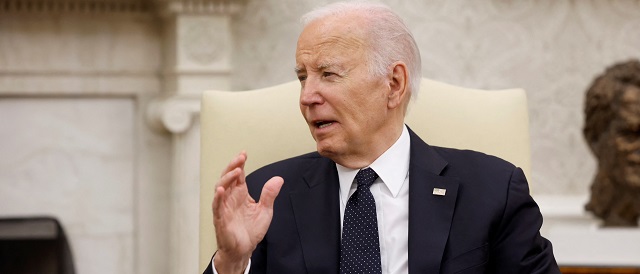
 From the Daily Caller News Foundation
From the Daily Caller News Foundation
By JASON COHEN
Agencies in President Joe Biden’s administration have resumed their perceived disinformation censorship collaboration with social media companies, Senate Intelligence Committee Chairman Mark Warner told reporters at a recent security conference, Nextgov/FCW reported.
The administration stopped “misinformation” censorship collaboration with social media platforms after a July Missouri v. Biden ruling to prevent federal agencies from coordinating with social media companies, but recently restarted this work, Warner # reporters, according to Nextgov. He said the cooperation resumed as the Supreme Court heard oral arguments in the case, now called Murthy v. Missouri, in March, where multiple justices indicated they supported the Biden administration’s viewpoint that it has the right to work with platforms to combat what it believes is harmful content.
Democrat Senator Mark Warner says there’s a “voluntary agreement about disinformation and misinformation in elections” between “all 20 of the major social media companies” pic.twitter.com/YmIyAuJBrw
— RNC Research (@RNCResearch) April 21, 2024
“There seemed to be a lot of sympathy that the government ought to have at least voluntary communications with [the companies],” Warner said, according to Nextgoc. He also reportedly called on the Biden administration to take strong action against any foreign countries that try to interfere in the 2024 election.
The agencies include the Department of Homeland Security’s Cybersecurity and Infrastructure Security Agency (CISA) and the Federal Bureau of Investigation (FBI), according to NextGov.
“If the bad guy started to launch AI-driven tools that would threaten election officials in key communities, that clearly falls into the foreign interference category,” he added.
A district court judge issued an injunction in July preventing certain officials in agencies from the Department of Health and Human Services (HHS) to the FBI from communicating with social media platforms to censor speech, characterizing the government conduct exposed by the plaintiffs in the case as arguably “the most massive attack against free speech in United States’ history.”
Justices Sonia Sotomayor, Elena Kagan and Ketanji Brown Jackson, expressed concern during March oral arguments about restricting the government’s ability to persuade companies to take action when necessary, such as when terrorists disseminate speech on a platform.
The justices also questioned whether the plaintiffs could prove their platforms censored their speech as a direct result of the government.
Facebook executives believed they were engaged in a “knife fight” with Biden’s White House on COVID-19 censorship, according to a recent House Judiciary Committee report. Biden accused the platform of “killing people” in July 2021 for not censoring so-called COVID-19 misinformation, and unearthed WhatsApp messages between Facebook executives revealed that they were unhappy about the president’s remarks.
Warner, the White House and the FBI did not immediately respond to the Daily Caller News Foundation’s request for comment. CISA declined to comment, but notified the DCNF about an Election Security hearing in the coming weeks with the agency’s Director, Jen Easterly.
-

 John Stossel2 days ago
John Stossel2 days agoThe Swamp Survived: Why Trump Failed to “Drain the Swamp”
-

 COVID-192 days ago
COVID-192 days agoCOVID Is Over — But Did We Learn Anything From It?
-

 Energy2 days ago
Energy2 days agoU.S. EPA Unveils Carbon Dioxide Regulations That Could End Coal and Natural Gas Power Generation
-

 Opinion1 day ago
Opinion1 day agoBoy Scouts of America changes name to ‘Scouting America’ to be ‘more inclusive’
-

 Fraser Institute2 days ago
Fraser Institute2 days agoTrudeau and Ford should attach personal fortunes to EV corporate welfare
-

 conflict2 days ago
conflict2 days ago‘Got Played’: Israel Reportedly Suspicious Biden Admin Had Backroom Talks With Mediators Over Ceasefire Deal
-

 Environment2 days ago
Environment2 days agoScientific Report Pours Cold Water On Major Talking Point Of Climate Activists
-
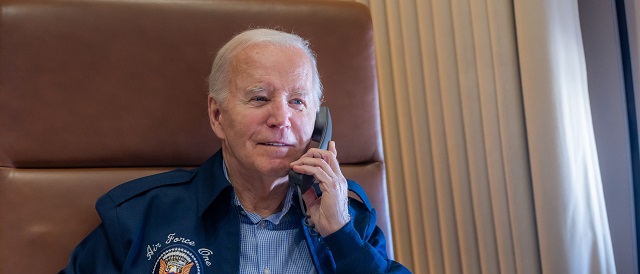
 conflict2 days ago
conflict2 days agoAmerica Is Really Bad At Foreign Interventions. Why Does Biden Think Ukraine Will Be Any Different?


